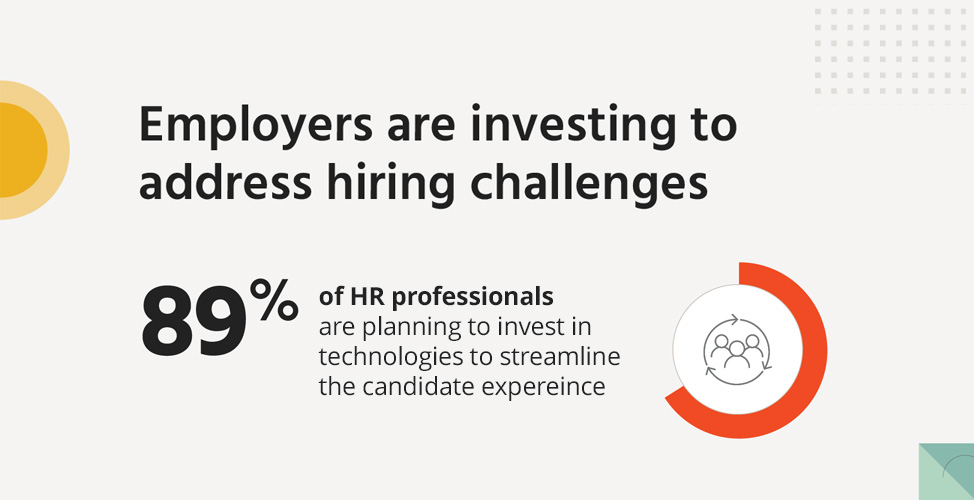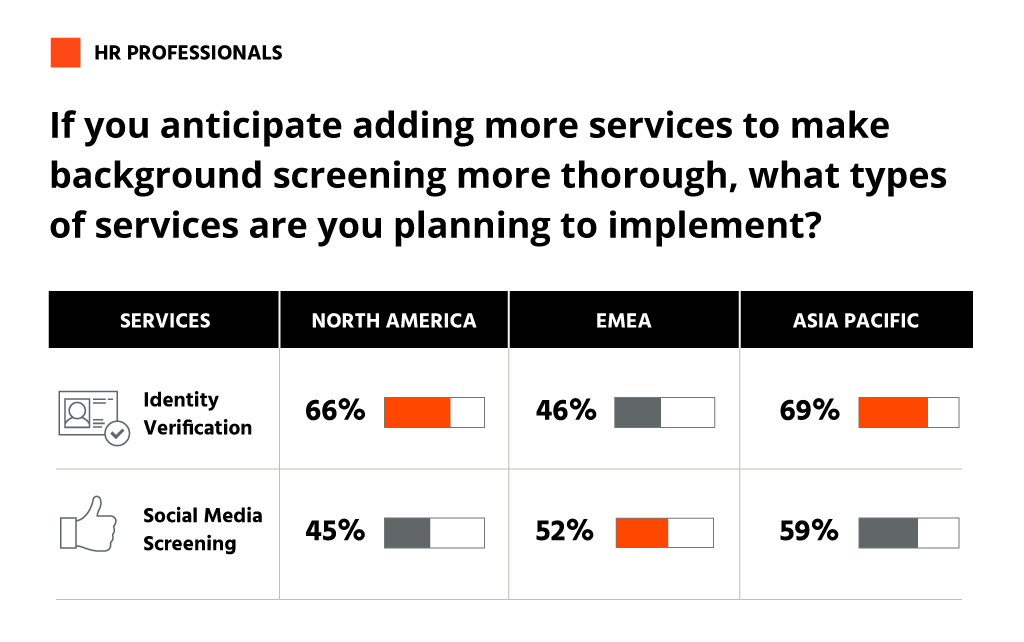
-
Services
All ServicesIdentityPre-HirePost-HireSolutionsTechnology
-
Industries
- Integrations
-
Resources
-
About Us
January 18th, 2024 | Sterling

Throughout 2023, the Canadian job market has remained competitive, especially when recruiting skilled workers. According to a 2023 survey conducted by Robert Half Canada, 92% of hiring managers who are looking to recruit say they face challenges finding and attracting skilled talent. Worker shortages are particularly noticeable in some industries, such as finance, accounting, and technology. Given these ongoing challenges, it is crucial for companies to understand what candidates are looking for and find new ways to stay competitive in the hiring landscape.
In 2022, Sterling conducted Hiring Reimagined, a comprehensive industry survey intended to gain a better understanding of current hiring and background screening challenges. Above all, we wanted to determine:
Over 1,200 HR professionals and more than 3,700 job seekers across multiple regions and industries participated in the survey.
While our research revealed a wealth of valuable insights, one major theme reinforced itself throughout the report: HR professionals are increasingly looking to invest in and adopt new technologies to improve the hiring process and retain skilled talent.
In this blog, we’ll highlight some of our findings in more depth, including how employers hope to leverage modern background screening technology to enhance the overall candidate experience, and how ongoing investments in technology are shaping the future of the hiring and screening processes.
Our original research found that, of those survey respondents investing in their hiring process, the vast majority (89%) are actively investing in new technology to streamline the candidate experience and automate hiring. As our report concludes from this statistic, HR staff are looking to technology to help them operate more effectively and adapt to shifts in the job market. Seamlessly integrating background screening with the rest of the hiring workflow is one of the many ways through which employers can simplify the process, both for their staff and their candidates.
New hiring trends include an increased candidate demand for transparency in the hiring process. An astounding 78% of candidates surveyed told us that “communication and proactive updates” were an important aspect of their background screening experience. Modern candidate experiences can give candidates insight into the process through step-by-step instructions and automated notifications at relevant touchpoints.

Today, it’s not only possible, but easily achievable, to provide a background check process that is seamless, accurate, and efficient. This process should also express (through ongoing engagement) an organization’s underlying values and culture, as well as its genuine interest in the candidate’s safety and well-being. By utilizing modern screening solutions powered by automation, in addition to tools like Sterling’s award-winning Candidate Hub, employers can dramatically reduce time-to-hire while optimizing candidate satisfaction, and never compromising on quality or compliance.
Today’s candidates are increasingly cautious when it comes to workplace safety, which our survey response reflected. In a surprising finding, 59% of job seekers stated that their background screening experience made them feel more confident about the job or the organization. By utilizing modern background screening solutions, employers can demonstrate their commitment to fostering a safer workplace.
Alarmingly, however, the surge in remote work has led to a rise in fraud and identity theft. In another recent Sterling survey conducted in partnership with Staffing Industry Analysts (SIA), more than 30% of the 188 staffing companies surveyed reported an incident in which an employee who showed up for a job turned out to be someone different than initially claimed. Fortunately, HR professionals are not in the dark when it comes to these issues. Our research found that more companies around the world are planning to invest in identity verification services than in any other hiring technology.

Hailing from several regions including North America, EMEA, and Asia Pacific, our respondents also named social media screening as their second-highest priority (the first in EMEA), revealing their urgent need to add this new technology to the hiring process. AI-based social screening solutions eliminate bias and help address candidate concerns regarding the scrutiny of private social media activities in an employment context. For this reason, they are an invaluable asset to employers looking to create a safer, more authentic workplace while remaining compliant with privacy regulations.
In addition to expressing the need to enhance their identity verification tools, nearly half of our respondents agreed that background screening will also become more thorough in the next two years, with 52% of respondents actively planning to add more comprehensive screening solutions in the near future.
Although our report highlights the reality of a uniquely challenging landscape for HR professionals, it also reveals the inherent opportunity of investing in modern technology to improve the hiring process. In fact, only 11% of our respondents said they had no intention of making any investments to alleviate hiring challenges. Overall, 40% intend to use technology to further automate their processes, while 36% want to integrate background screening and identity verification into their hiring workflow to create a more seamless experience.
Investment in background screening and identity verification is emerging as a consensus solution among business leaders who increasingly agree that these processes stand to benefit significantly from digital transformation. On page 17 of our report, our HR respondents were asked which changes they anticipate their organizations will make to their background screening programs in the next two years. The majority (52%) answered, “adding more services to make background screening more thorough.”
The bottom line? Hiring challenges facing organizations today are uniquely dynamic, and we can’t expect them to disappear overnight. However, when HR teams take the time to understand why job seekers are frustrated and where they can better align with these desires and expectations, they are immediately in a better position to improve the candidate experience. Deploying new technologies, such as automated workflows, digital identity solutions, and user-friendly candidate hubs, is one of the many ways employers can streamline hiring and show their commitment to building a culture of trust and safety.
Learn more about how investments in technology are shaping the future of background screening. Download the full report here. If you want to know more about how Sterling Backcheck can help you implement new technologies to improve your candidate experience, contact our experts.
This content is offered for informational purposes only. First Advantage is not a law firm, and this content does not, and is not intended to, constitute legal advice. Information in this may not constitute the most up-to-date legal or other information.
Readers of this content should contact their attorney or lawyer to obtain advice concerning any particular legal matter. No reader, or user of this content, should act or refrain from acting on the basis of information in this content without first seeking legal advice from counsel or lawyers in the relevant jurisdiction. Only your individual attorney or legal advisor can provide assurances that the information contained herein – and your interpretation of it – is applicable or appropriate to your particular situation. Use of, and access to, this content does not create an attorney-client relationship between the reader, or user of this presentation and First Advantage.